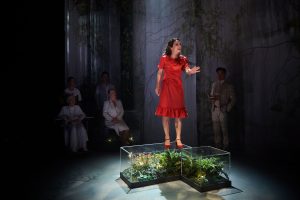Ensemble Theatre, May 19
8.5/10

Never did Tennessee Williams creep so close to the Gothic horror of Edgar Allan Poe as in 1957’s Suddenly Last Summer. Never was his imagery so confronting. White is the recurrent colour: not an innocent white, but a malevolent one. The Spanish sun, Catharine tells us, looked “as if a huge white bone had caught fire in the sky”, and Williams describes the play’s New Orleans garden setting as having a “savage nature”.
So do the humans.
One is dead when the play begins. Mrs Venable (think “venal”) has lost her only son, Sebastian. He was her grand passion, the sun and moon of her life, and someone is going to pay for this loss, regardless of the details of his death. In her own mind she alone understood his peculiar temperament as a poet – even if he only wrote one poem a year, and kept that much a secret from the world. She was his muse, an almost holy function, and she idealises him to the point of idolatry.

Both Mrs Venable (Belinda Giblin) and her niece Catharine (Andrea Demetriades) are trapped inside their own imaginations, and neither place has a “welcome” mat at the door. Giblin gives us a Mrs Venable who relishes the suffering of others like some do rare steak, her drool all but visible as she contemplates it. And she’s the stable one. Poor Catharine is deemed insane, and left to bounce between asylum walls. No one seems to take into account the fact that she was raped. No one hears the comparatively honest simplicity of her attitude towards Sebastian (“He liked me, and so I loved him”), nor her acerbic perspicacity when it comes to human relationships in general: “We all use each other, and that’s what we think of as love.”
She suffers for being the only family member with no allergy to truth, and Demetriadis rises to this suffering without letting her Catharine succumb to histrionics. Could she have dared to impale us more deeply on Cathy’s suffering? Perhaps. But then director Shaun Rennie could finesse several aspects of his production, just as someone mixes the correlation between instruments on a record. Giblin is too soft to start (when what she says is more strident), and Socratis Otto excessively caricatures George, Catharine’s grasping brother. Valerie Bader, by contrast, is exceptional, able to strip the flesh off any pretence at familial love with a single cheese-grater smile. Remy Hii gives a sterling performance as the Doctor, apparently at very short notice, and Kate Skinner completes the cast of six.

Designer Simone Romaniuk serves up Williams’ “savage” garden trapped in glass cases, like caged animals, and dresses the characters in white, cream and ivory (echoing that white bone in the sky), other than Catharine, who wears blood red. Kelly Ryall sculpts an eerie and malicious sound world, replete with the muted shrieks and cries of insects, birds, and other creatures without name.
Williams’ genius is on full display as his poeticism intensifies the drama, rather as a magnifying glass makes the sun murderous when held above an ants’ nest. It’s a play that drips life the way that a snapped sugarcane stalk drips nectar, and yet Rennie’s production could inhabit the play’s psychology more and its physicality less – although his staging of the climactic scene is pitch-perfect, ensuring it grips us to the last. “I think I’m just dreaming this,” says Catharine at one point. “It doesn’t seem real.” If only, for her sake, that were true.
Until June 10.